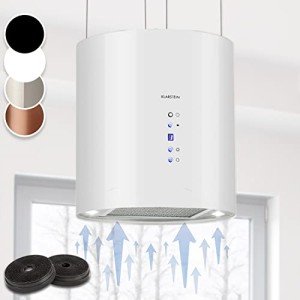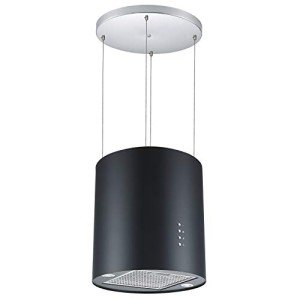What's The Reason Everyone Is Talking About Island Extractor Hood Today
페이지 정보
본문
Understanding Island Extractor Hoods: A Comprehensive Guide
In modern cooking areas, the function of an extractor hood, particularly the island kitchen extractor hoods extractor hood, can not be overemphasized. These home appliances not just boost the looks of a kitchen but likewise play a vital role in keeping air quality. In this article, we will explore what island extractors are, their benefits, types, setup considerations, maintenance ideas, and address some often asked questions to assist home cooks and house owners in making informed choices.
What is an Island Extractor Hood?
An island extractor hood, likewise known as an island range hood, is a type of ventilation system that is suspended above a kitchen island cooktop, where cooking happens. Unlike conventional wall-mounted hoods, which are affixed to walls, island hoods hang from the ceiling, providing unobstructed views and guaranteeing effective ventilation for all kinds of cooking activities.
Benefits of Island Extractor Hoods
Island extractor hoods provide a wide range hoods for islands of advantages:
- Enhanced Air Quality: They effectively remove smoke, steam, and cooking odors, promoting a healthier kitchen environment.
- Aesthetic Appeal: Available in different designs and finishes, island hoods can function as a stunning focal point in open-concept cooking areas.
- Flexibility: Many models feature versatile ventilation alternatives, catering to both ducted and ductless setups.
- Sound Reduction: Advanced innovation in contemporary extractor hoods frequently lessens operational sound, enabling a pleasant cooking experience.
- Lighting: Many 48 island range hood hoods are equipped with integrated lights that illuminate the cooking area, improving presence during meal preparation.
Types of Island Extractor Hoods
When selecting an island extractor hood, you will experience a number of types. Here's a quick summary:

| Type | Description |
|---|---|
| Ducted | Ventilation system that requires ductwork to channel air outside the home. |
| Ductless | Utilizes filters to clean up the air before recirculating it back into the kitchen; ideal for apartment or condos. |
| Convertible | Can work as both ducted and ductless, offering versatility based upon the kitchen island cooker hood layout. |
| Integrated | Built directly into cabinets or lighting, providing a smooth, unobtrusive design. |
| Wall-mounted | Although not standard island hoods, some wall-mounted hoods can be installed in such a way that serves kitchen islands. |
Installation Considerations
When installing an island extractor fans extractor hood, there are several essential factors to think about:

- Height: The hood needs to be set up at a height of 28 to 30 inches above the cooktop to efficiently capture smoke and odors.
- Ventilation: Ensure proper ducting is offered if choosing a ducted design, especially in homes with complex layouts.
- Airflow Capacity: Choose a hood with adequate CFM (cubic feet per minute) score to match the cooking device. As a guideline of thumb, multiply the BTUs of your cooktop by 1.5 to determine the needed CFM.
- Power Supply: Verify that electrical wiring fulfills the hood's operational requirements. Consult a service technician if modification is needed.
Upkeep Tips for Island Extractor Hoods
Proper upkeep ensures the longevity and performance of your island extractor island range hood ideas hood. Follow these suggestions:
- Regular Cleaning: Clean the exterior surface areas and the grease filters regular monthly. Most filters can be washed in warm, soapy water.
- Check Light Fixtures: Inspect and replace bulbs as needed to make sure the cooking area is well-lit.
- Examine for Duct Blockages: If using a ducted system, regularly inspect ducts for obstructions to ensure optimum airflow.
- Screen Noise Levels: If your hood starts to make uncommon noises, look for loose parts or debris within the system.
- Arrange Professional Maintenance: Consider having a professional inspect and service your hood each year to deal with any possible concerns.
Frequently asked questions
What is the ideal CFM for an island extractor hood?
The perfect CFM depends upon your cooktop's BTU. For most home cooking, a series of 600 to 1200 CFM is recommended, depending upon the intensity of your cooking practices.
Can I install an island extractor hood myself?
While DIY setup is possible for those with experience, having a professional install your island hood is advisable to ensure ideal performance and safety.
Are ductless island extractor hoods effective?
Ductless hoods can be efficient in eliminating smoke and odors when geared up with premium filters, however they may not be as efficient as ducted versions in aerating hot air.
How frequently should I replace the filters?
For ductless models, it is advised to change the filters every 6 months to a year, depending on usage. Always describe the manufacturer's guidelines for specifics.
Island extractor hoods elevate both the functionality and aesthetic appeal of modern-day kitchen areas. With numerous types, installation options, and upkeep ideas, homeowners can discover the ideal option to fit their cooking needs and design preferences. By buying a quality Island range hood ideas extractor hood, one not only boosts their cooking environment but likewise promotes a much healthier home. As you navigate alternatives, keep in mind to consider your kitchen design and cooking habits to choose a hood that perfectly suits your culinary lifestyle.

